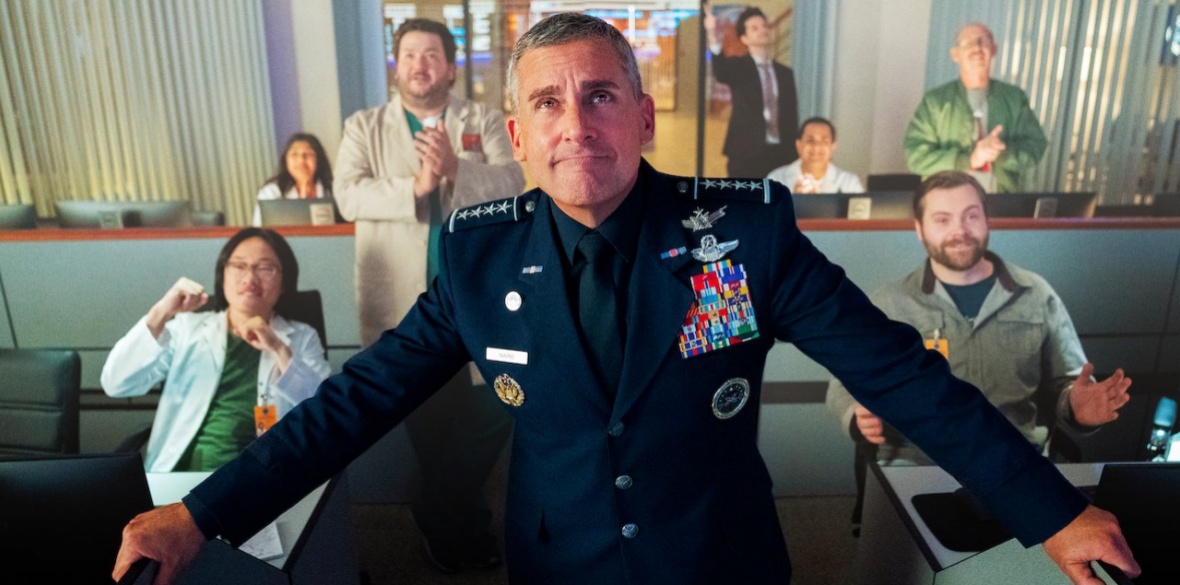This is the last article you can read this month
You can read more article this month
You can read more articles this month
Sorry your limit is up for this month
Reset on:
Please help support the Morning Star by subscribing here
WHAT could be hipper than a satirical treatment of Trump’s latest wasteful wheeze, United States Space Force (USSF), the space-warfare service branch of the US armed forces?
And who better to do it than the team that brought us the US version of The Office, a funny and occasionally fatal skewering of the corporate ethos, originally conceived by that grand master of roasting Hollywood Ricky Gervais?
Would that had happened. Instead Netflix’s Space Force, co-created by The Office show-runner Greg Daniels and star Steve Carell is tepid and often unfunny. It neither skewers nor lambasts but often romanticises what the US is doing in space.
Rather than aspiring to holding on to the wonder of the scientific exploration of space, the reality is instead a US vision of dangerous and expensive conquest which could add yet another threat to the future of this planet. The Pentagon phrase the series uses to describe the project is the bellicose “Boots on the Moon.”
Trump may be a waddling, portly Darth Vader who would fall down if he tried to wield a laser sword but behind him is the full might of the Pentagon and especially the powerful US arms industry which can’t wait to feast once again at the public trough this project has filled.
USSF, with perhaps a $25 billion price tag over the first five years, is described by the administration as a project that will allow the US to achieve full-force dominance, controlling Earth by deciding who can and can’t leave the planet and allowing the US to mine the moon and possibly Mars.
It is claimed that this mission could be “the largest industrial project in human history” with space no longer, as in previous treaties, declared a global commons but rather a domain which, as Trump says, “belongs to us.”
USSF, which poses inherent dangers to the planet in launching nuclear-powered space ships, is the US response to China’s Belt and Road initiative. That project, linking Asia to Europe, might indebt other countries to China and involve destructive ecological components such as dams. But it would also raise the living standards of millions.
The US counter-proposal is Space Force — to which Japan has already enlisted — and it involves starting a costly arms race. It is what the late political economist and sociologist Giovanni Arrighi described as international mafia-style protection racket: “Pay up and join us as junior partner or we will declare you an enemy and come with force against you.”
The show, featuring exterior shots of the Pentagon — suggesting they were done with the complicity of the military — enlists Carell as General Mark Naird, head of the force.
Socially challenged, he’s partially hard-edged and partially decent and in some ways similar to his character in The Office — a boss who wants to be liked but who’s surrounded by other characters who often held him up to deserved ridicule.
That’s not the case here. Space Force goes to great lengths to preserve Naird’s decency in the chaos that surrounds him, all of which makes the show less funny. Dr Strangelove this is not, and the way punches are pulled in the series is an indication of the presence and pressure of the Pentagon and its chilling effect on US culture.
There are some brilliant asides, as when Naird defends the efficiency of the US Post Office and the project’s chief scientist Dr Mallory (John Malkovich) tells him that the Post Office is now defunct. “Where do you think they got the money for this project?” he declares.
But, mostly, the show toes the Pentagon-arms industry line. The project must accelerate because first India and then China threatens to surpass it. This is one of the mendacious rationales for the Space Force because China and Russia are both far behind and neither have the desire nor the economic power to compete with the US in space.
If pushed, though, they must and by the end of season one Space Force must counter an aggressive Chinese move to claim a section of the moon that will keep the US from landing its spaceship.
There is a nice budding relationship between the Chinese-American nerd scientist (they always funny Jimmy O Yang) and a woman African-American hipster pilot who’s become an astronaut. The relationship develops while she is in space and he is in the control room and this interplanetary social distancing accounts for some of the better moments of the series.
But they are not though to save it. The show unfortunately fits too much like a glove into the latest component of what president Eisenhower warned was a grave threat to US democracy, with one added component: the military-industrial-entertainment complex.












